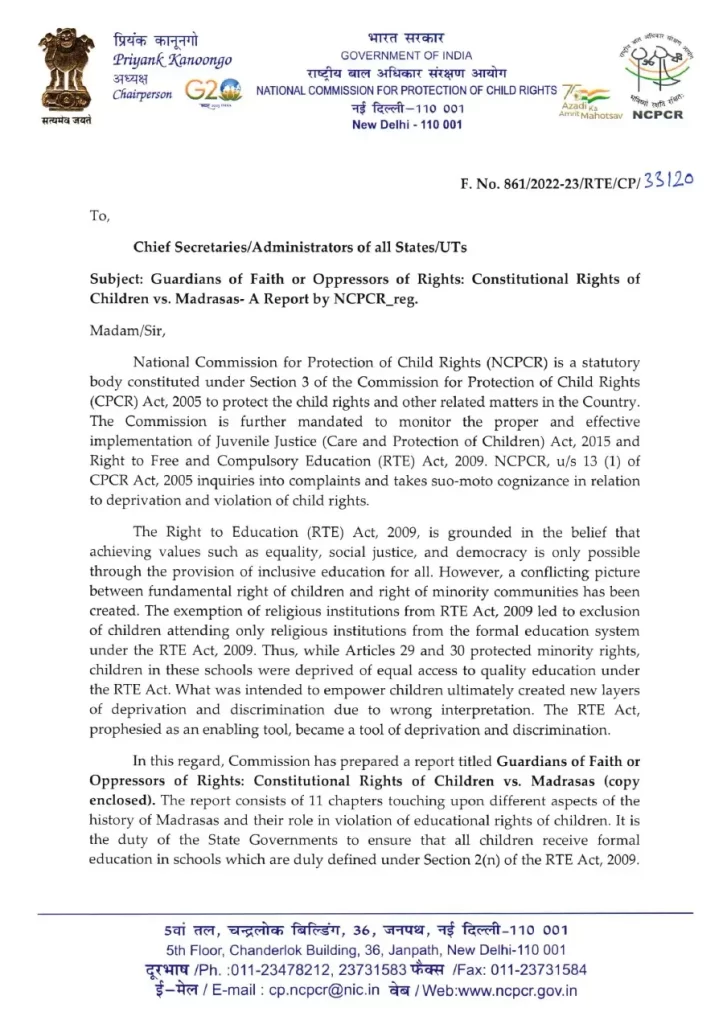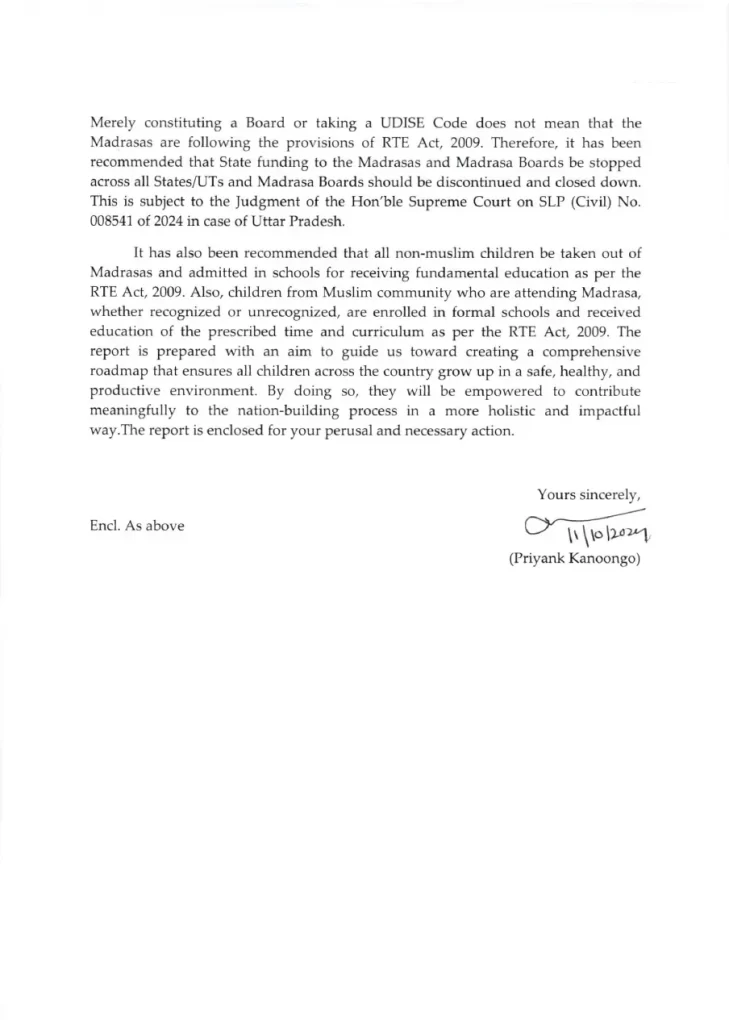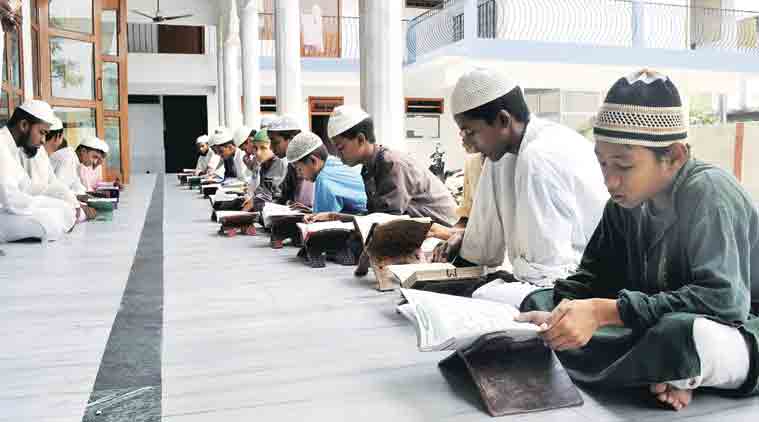
NEWS COURTESY BY indianexpress
BJP ally LJP says shouldn’t be done blindly, Congress says panel should give remedies
Written by Abhinaya Harigovind
The National Commission for Protection of Child Rights (NCPCR) has written to the chief secretaries of all States and Union territories recommending that madrasa boards be “discontinued and closed down”, State funding to madrasas and madrasa boards be stopped, and children attending madrasas be enrolled in “formal schools.”
While Congress said it would comment after reading the letter, the party’s Cabinet Minister for Electronics, IT, Biotech, Rural Development and Panchayati Raj in Karnataka, said, a commission should ideally give remedies than to ask states to stop funding and shut down madrasas. “And it is so ironic to see this development days after Maharashtra government decide to triple the salaries of madrasa teachers,” he told The Indian Express.
BJP’s ally in the Centre, Lok Janshakti Party spokesperson AK Bajpayee said, “If any madrasa is found running illegally, it should be shut down. But nothing should be done blindly.” He told The Indian Express he was not aware if NCPCR wrote the letter following receipt of any adverse reports from states.
“There should be proper survey of all madrasas to find if there are any irregularities. And they should be given ample opportunity to explain themselves if any illegality is found,” LJP’s Bajpayee said.
Also read | Madrasas ‘unsuitable’ places to get proper education, child rights body tells SC
The October 11 letter from NCPCR Chairperson Priyank Kanoongo said, “It has also been recommended that all non-Muslim children be taken out of madrasas and admitted in schools for receiving fundamental education as per the RTE Act, 2009. Also, children from Muslim community who are attending Madrasa, whether recognized or unrecognized, are enrolled in formal schools and received education of the prescribed time and curriculum as per the RTE Act, 2009.”
Letter to All Chief Secretaries by Express Web on Scribd


BJP’s ally JD(U) was not available for comment. Another ally TDP refused to comment. Samajwadi Party MP and spokesperson Anand Bhadauriya said that the letter of the NCPCR appears politically motivated and aimed to create hatred and divide in the society. A number of madrasas are doing excellent work and generating scholars, but attempts are being made for long to create a misconception. Further children from financially poor families study here. “This ridiculous letter must be withdrawn,” he said.
Written by Abhinaya Harigovind
The commission has, along with the letter, sent a recent report prepared by the NCPCR titled ‘Guardians of Faith or Oppressors of Rights: Constitutional Rights of Children vs Madrasas’ which claims that madrasas “violate the educational rights of children.”
The National Commission for Protection of Child Rights (NCPCR) has written to the chief secretaries of all States and Union territories recommending that madrasa boards be “discontinued and closed down”, State funding to madrasas and madrasa boards be stopped, and children attending madrasas be enrolled in “formal schools.”
While Congress said it would comment after reading the letter, the party’s Cabinet Minister for Electronics, IT, Biotech, Rural Development and Panchayati Raj in Karnataka, said, a commission should ideally give remedies than to ask states to stop funding and shut down madrasas. “And it is so ironic to see this development days after Maharashtra government decide to triple the salaries of madrasa teachers,” he told The Indian Express.
BJP’s ally in the Centre, Lok Janshakti Party spokesperson AK Bajpayee said, “If any madrasa is found running illegally, it should be shut down. But nothing should be done blindly.” He told The Indian Express he was not aware if NCPCR wrote the letter following receipt of any adverse reports from states.
“There should be proper survey of all madrasas to find if there are any irregularities. And they should be given ample opportunity to explain themselves if any illegality is found,” LJP’s Bajpayee said.
stories You may Like
Baba Siddique News Live Updates: CM Shinde orders state funeral to NCP leader; cops confirm gangster Lawrence Bishnoi’s involvement in killingElection Results 2024 Live: Made EC aware of 20 complaints from 7 constituencies, demanded sealing of EVMs, says CongressAs UN peacekeepers come under fire, India backs joint statement against Israeli action
Also read | Madrasas ‘unsuitable’ places to get proper education, child rights body tells SC
The October 11 letter from NCPCR Chairperson Priyank Kanoongo said, “It has also been recommended that all non-Muslim children be taken out of madrasas and admitted in schools for receiving fundamental education as per the RTE Act, 2009. Also, children from Muslim community who are attending Madrasa, whether recognized or unrecognized, are enrolled in formal schools and received education of the prescribed time and curriculum as per the RTE Act, 2009.”
Letter to All Chief Secretaries by Express Web on Scribd
BJP’s ally JD(U) was not available for comment. Another ally TDP refused to comment. Samajwadi Party MP and spokesperson Anand Bhadauriya said that the letter of the NCPCR appears politically motivated and aimed to create hatred and divide in the society. A number of madrasas are doing excellent work and generating scholars, but attempts are being made for long to create a misconception. Further children from financially poor families study here. “This ridiculous letter must be withdrawn,” he said.
Advertisement
Kanoongo’s letter claims that the exemption of religious institutions from the RTE Act, 2009 led to the “exclusion of children attending only religious institutions from the formal education system”, and that “while Articles 29 and 30 (of the constitution) protected minority rights, children in these schools were deprived of equal access to quality education under the RTE Act.” It adds that what was intended to empower children ultimately created new layers of “deprivation and discrimination due to wrong interpretation.”
Priyank Kharge said reports like ASER also point out flaws in government schools across state. “Does it mean you shut them down and governments stop running them? The report is not a law. The state government will study the report in detail, its findings, methodology, and based on that take a call,” he said.
Read more | Minority institutes can’t admit students under RTE even if they want to: Bombay HC
The commission has, along with the letter, sent a recent report prepared by the NCPCR titled ‘Guardians of Faith or Oppressors of Rights: Constitutional Rights of Children vs Madrasas’ which claims that madrasas “violate the educational rights of children.” The report claims that the curriculum in madrasas is not “as per the RTE Act” and the NCPCR found “abnormalities” in the curriculum – “objectionable content in Diniyat books” in the curriculum, teaching of texts that profess the “supremacy of Islam”, and the Bihar Madrasa Board prescribing books that are “published in Pakistan.”
It also claims that in the NCPCR’s interactions with state authorities it found that madrasas lack trained and qualified teachers as prescribed by the National Council for Teacher Education, and that the teachers in madrasas are “largely dependent upon the conventional methods used in learning Quran and other religious texts.” It adds that the RTE Act specifies qualifications for teachers and the pupil-teacher ratio, and in the absence of these provisions, children are “left in the hands of unskilled teachers.”
The report claims that these institutions impart Islamic education and are “not following the basic principle of secularism”; madrasas “deprive children” of facilities and entitlements which are provided to students studying in regular schools, like uniforms, books, and midday meals; schools that provide formal education are required to follow norms prescribed by the RTE Act, and with no such mechanism available for madrasas, they lack accountability and transparency in their functioning; madrasa boards are “providing Islamic religious education and instructions to non-Muslims and Hindus which is also a blatant violation of Article 28 (3) of the Constitution of India.” It adds that State governments need to take immediate steps to remove Hindu and non-Muslim children from madrasas.
In its report, the NCPCR has said that it had written to the Secretary, Department of School Education and Literacy, Ministry of Education, in June this year, to issue directions to States to inspect madrasas that have UDISE codes and withdraw recognition if these madrasas do not comply with the norms in the RTE Act. In July, the Ministry wrote to the education secretaries of States seeking a report on inspection of madrasas.
Explained | All you need to know about madrasas
Claiming that madrasas have an “arbitrary mode of working” without a standardized curriculum, the report recommends that all non-Muslim children be taken out of madrasas and admitted in other schools, States ensure that all Muslim children attending madrasas are enrolled in formal schools, and state funding to madrasas and madrasa boards be discontinued and these boards be closed down.
Last month, the NCPCR told the Supreme Court that education imparted in madrasas “is not comprehensive and is therefore against the provisions of Right to Education Act.” The NCPCR was making a written submission to the court which is seized of a clutch of appeals challenging the Allahabad High Court order which had declared the Uttar Pradesh Board of Madrasa Education Act, 2004 “unconstitutional” on the ground that it violated “the principle of secularism” and fundamental rights under Article 14 of the Constitution.
© The Indian Express Pvt Ltd
First uploaded on: 13-10-2024 at 07:38 IST

